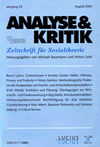Suchergebnisse
"Raymond Geuss"
Titel: The Moral Legacy of Marxism
Autor: Raymond Geuss
Seite: 51-70
Marx would not have anything much to contribute to contemporary discussions of `normativity´, because he would reject various of the assumptions on which they rest. Thus, he does not believe it possible to isolate `moral normativity´ as a distinct object of decontextualised study so as to derive from it rationally grounded imperative to individual action. This does not mean that Marx can provide no orientation for human action, but this has a different nature and structure. Marx suspicions of ethical theories are well founded, but his own productivist assumptions should be revisited.
Titel: Horkheimer, Religion, and the Normative Grounds of Critical Theology
Autor: Christopher Craig Brittain
Seite: 259-280
This essay examines how the legacy of Marx’s emancipatory commitments continues to be intertwined with his critique of religion. This is illustrated with reference to Raymond Geuss’s claim that Marxism’s political failure is related its lack of an adequate moral theory, a view that leads him to suggest that Marxism needs to function more like a `pseudo-religion´. These issues are analysed by drawing from Max Horkheimer’s writing on Christianity, which imply that materialist critical theory will be resourced by attention to particular historical expressions of religion. The paper argues that such an approach requires a distinction between two strands of Marx’s critique of religion an `eliminationist´ and a `descriptive functionalist´ perspective and involves privileging the second strand over the first. The implication is not that religion resolves the question of the ground of Marxism’s normative critique; rather, what is advanced is view that the critical theory can be supported and resourced by a critique of the `religion of everyday life´.

The Normative Turn from Marxism
2015 (37) Heft 1
Editorial
Marxism, both as a Western political movement and an intellectual focus of dispute, lost its academic appeal during the 1970s and 80s, foreshadowing the collapse of `actually existing´ socialism in the early 90s. Within what after the Second World War was called `Western Marxism´, there had been growing awareness of Marx’s early philosophy with its suggestive, if somewhat vague, ideas of a universally productive life and an ideal productive society. In contrast, the stock of (not only offici...